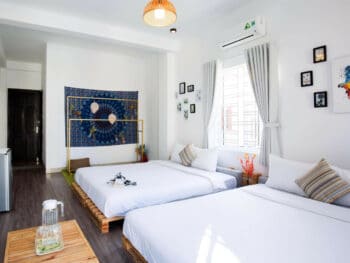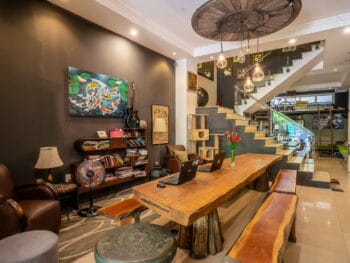For decades, tourists to Vietnam have relied on hotels, homestays, and hostels as their primary source of accommodations while visiting the country. However, in recent years, short-term vacation rental companies and websites like Airbnb and VRBO have been initiated in Vietnam and are developing quickly.
Apartment and Home Short-term Rentals
Staying at a vacation rental property can be a fun and unique way to embrace a new city, as the majority of the accommodations are owned by locals who open their homes to foreigners for their trip. Most hosts on AirBNB or VRBO sites feature discounts for booking at least a week, and sometimes even greater for those booking at least a month.
Guide to Holiday Rentals in Vietnam

When it comes to choosing a place to stay in Vietnam, hotels might be the type of accommodation you immediately think of. However, rental properties are starting to attract more tourists, especially those traveling in groups, families, or just love a sense of adventure.
In any case, there are a few things to consider before making a reservation to determine if a short-term rental is a suitable choice for you.
Process for Booking a Short-term Rental
Unlike hotels, making reservations to stay at a short-term rental can’t usually be done at the last minute since there’s a long process involved for booking these types of properties and the hosts often need time to respond to your request. No matter which website you use, the process starts with finding a rental that fits your needs.
You can search based on location using an interactive map or filter by amenities and see what’s available on your travel dates. Then, you submit a request to book the property and exchange messages with the host to make sure your reservation is good to go.
Sometimes, the host will have questions about you or your group and want to clarify their property rules before accepting your deposit.

Once you and the host come to an agreement, you can proceed by paying for your entire stay upfront. Depending on the host, cancellation policies may require you to give notice at least a month in advance to get a full refund, while others might only give you a partial refund with less notice.
Some hosts have a no-refund policy, and others will allow you to withdraw within 24 hours. After the payment is made, the host will contact you a day or two before your reservation to let you know how to check in. There are advantages and disadvantages to these kind of short-rental properties.
Pros:
- Rental properties excel at making guests feel at home since locals operate them.
- More opportunities for unique accommodations, primarily through Airbnb.
- Many options for families and bigger groups who want to visit together.
- Staying at one of these properties can save you a lot of money.
- Many rentals are cleaner than hotels.
- Immersion in a new city is easy.
Cons:
- A more complicated booking process, requiring communication with the host before confirmation.
- Cancellations often need to be done further in advance than hotels.
- Some hosts are picky and have lots of rules.
- Rentals are not always money-savers.
Differences in Short Term Rental Companies
For the most part, companies like Airbnb and VRBO offer a very comparable service. They are generally booked in the same way, by finding properties based on your dates and desired location. Often, one property might even be advertised on both websites.

Airbnb rentals have more variety in the types of accommodations that you can book, and this includes shared spaces like a single bedroom in a family’s home. VRBO does not offer shared rooms, so all guests have to reserve an entire house, apartment, or condo. For that reason, VRBO is better for traveling groups, and Airbnb is more ideal for singles or couples but can serve larger groups as well.
Likely Required Documents to Have Before Your Trip
It’s important to remember that when making a reservation at a Vietnamese Airbnb or VRBO property, you will likely need to have a copy of your passport just as you would for a hotel.
Also, most travelers are issued a 14-day visa for free, so if you plan on staying longer than that and having a reservation that exceeds two weeks, you will have to make time to renew it before it expires. Or, you can purchase a more extended visa online for between 30 and 90 days at the cost of between $25 and $50, depending on the length of your stay.










